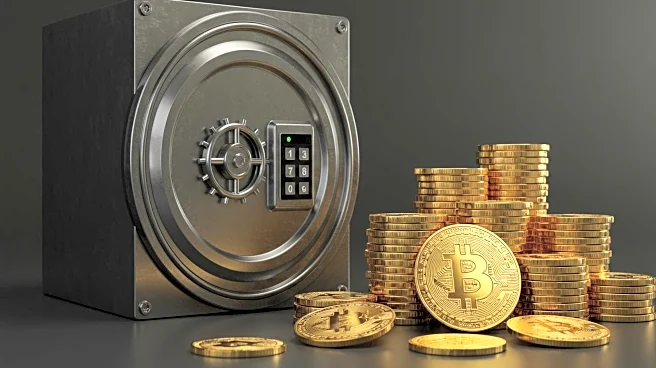What's Happening?
The United States has established a Strategic Bitcoin Reserve, marking a significant step in the institutionalization of cryptocurrencies. President Trump signed an executive order to centralize the management of seized crypto assets, focusing primarily on Bitcoin. The reserve holds approximately 200,000 BTC, valued at nearly $24 billion, sourced from forfeited assets. This move positions digital assets as a legitimate component of national financial infrastructure. The Treasury and Commerce Departments oversee the reserve's strategic direction, while the U.S. Marshals Service manages the seized digital assets. The government has paused regular sales of Bitcoin to stabilize the market, mirroring the management of traditional strategic assets like the Strategic Petroleum Reserve. This development aligns with the administration's broader regulatory agenda, including the introduction of the GENIUS Act, which requires full backing for stablecoins and enhances oversight to maintain financial stability.
Why It's Important?
The establishment of the Strategic Bitcoin Reserve signifies a shift in how digital assets are perceived within national financial strategies. By institutionalizing Bitcoin, the U.S. aims to consolidate its position in the global digital asset market, potentially influencing global financial markets and regulatory frameworks. The move could enhance financial stability by reducing market volatility associated with auction-driven downward pressure on Bitcoin prices. It also sets a precedent for other countries to follow, potentially reshaping global crypto management strategies. The administration's ambition to make the U.S. the 'crypto capital of the world' reflects a growing recognition of digital assets as part of national wealth and financial strategy.
What's Next?
The strategic reserve is expected to continue developing, with potential impacts on financial markets, regulatory frameworks, and international policy. The administration's support for American Bitcoin, a Trump-backed firm, in acquiring Bitcoin from Asian markets to expand the national reserve, indicates ongoing efforts to strengthen the U.S.'s position in the crypto market. As the reserve grows, its influence on global financial strategies and investor confidence will be closely monitored. The U.S.'s approach may encourage other nations to institutionalize crypto assets, potentially leading to a more regulated and stable global crypto market.
Beyond the Headlines
The establishment of the Strategic Bitcoin Reserve raises questions about the ethical and legal dimensions of managing seized assets. The decision to pause Bitcoin sales to stabilize the market could be seen as a strategic move to protect national interests, but it also highlights the complexities of integrating digital assets into traditional financial systems. The GENIUS Act's requirement for full backing of stablecoins and enhanced oversight reflects a cautious approach to ensuring financial stability while embracing innovation. This development may trigger long-term shifts in how cryptocurrencies are regulated and perceived globally.











